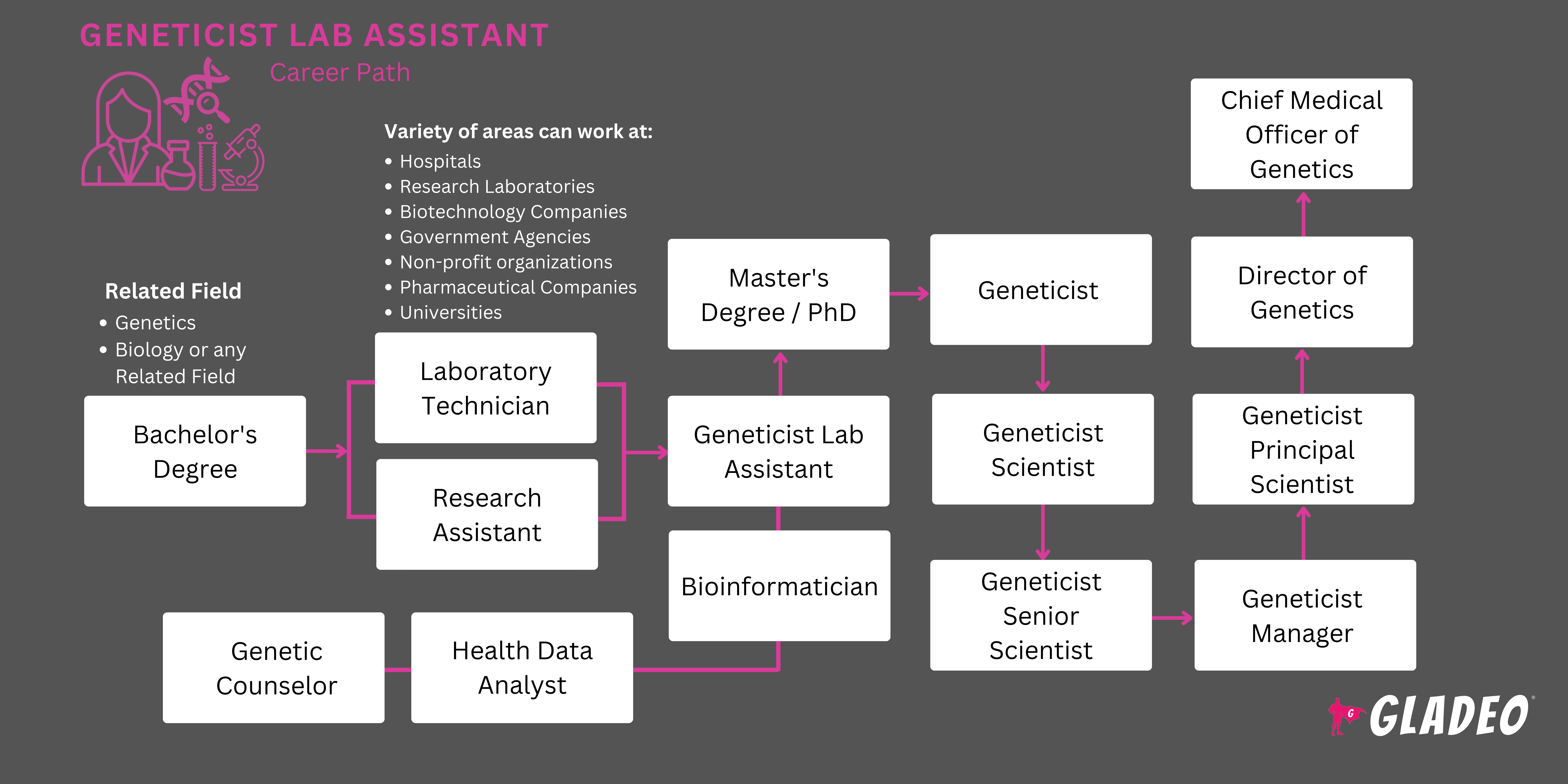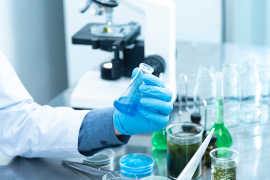스포트라이트
Lab Assistant – Genetics, Genetics Laboratory Assistant, Genetics Lab Technician, Laboratory Support Technician – Genetics, Genetic Testing Technician
유전학 연구실은 과학자들이 인간, 동물 또는 식물의 DNA가 성장, 건강 및 생물학적 삶의 다른 측면에 어떤 영향을 미치는지 이해하기 위해 연구하는 곳입니다.
유전학자 실험실 조교는 DNA 샘플 준비, 테스트 실행, 실험 결과 문서화 등의 업무를 처리하는 실험실의 중요한 팀원입니다. 이들은 실험실 장비를 관리하고 모든 것이 깨끗하고 보정되어 올바르게 작동하는지 확인하는 일을 담당합니다.
모든 유전자 검사실에서는 안전이 최우선이기 때문에 어시스턴트는 안전 프로토콜을 시행하며 장비가 올바르게 사용되고 폐기물이 규정에 따라 처리되는지 확인합니다. 또한 충분한 양의 소모품을 보유할 수 있도록 재고를 관리합니다.
유전학자 실험실 보조원의 역할은 획기적인 유전자 발견이 이루어지는 안전하고 효율적이며 규정을 준수하는 연구 환경을 유지하는 데 매우 중요합니다!
- 획기적인 연구를 위한 작업 시작
- 유전 질환 연구 및 치료의 발전에 기여합니다.
- 과학 커뮤니티 내에서 커리어 성장을 위한 기회
근무 일정
- 유전학자 실험실 보조원은 통제된 환경에서 풀타임 또는 파트타임으로 일할 수 있습니다.
일반적인 의무
- 정확한 결과를 보장하기 위한 장비 준비, 유지보수 및 보정
- 실험실 재고를 관리합니다. 소모품, 시약, 장갑, 마스크 등을 재주문하세요. 부패하기 쉬운 품목의 유통기한 확인
- 유전자 분석을 위해 혈액, 조직, 타액과 같은 생물학적 샘플을 수집합니다.
- 유전학자의 감독 하에 샘플에서 DNA 추출을 수행합니다.
- 보관 및 향후 사용을 위한 샘플 및 시약 준비
- 추가 연구를 위해 DNA를 증폭하는 중합효소 연쇄 반응(PCR) 검사를 수행합니다.
- 시퀀서 및 마이크로어레이와 같은 기기 운영
- 소프트웨어 도구를 사용하여 유전자 데이터를 분석하여 변이와 이상 징후를 식별합니다.
- 테스트 및 대조군 비교를 통한 실험 결과 검증
- 프로토콜 및 결과 기록 유지
- 실험실 환경의 온도와 청결 상태를 지속적으로 모니터링합니다.
- 생물학적 안전 규정을 준수하여 오염을 방지하고 위험 물질의 안전한 취급을 보장합니다.
- 생물학적 물질을 제거하고 적절한 오염 제거(필요한 경우), 라벨링, 운송, 보관 또는 폐기를 보장합니다.
- 청소 및 살균을 위해 오염된 물품을 수집하거나 메모해 둡니다. 소독제, 소독제 또는 오토클레이브(해당되는 경우)를 사용하여 필요에 따라 장치와 장비, 소모품 및 기타 품목을 물리적으로 청소합니다.
- 수행해야 하거나 이미 수행한 작업을 추적할 수 있는 기록을 유지하세요.
추가 책임
- 전문 테스트를 위해 외부 연구소 및 시설과 협력하기
- 보조금 제안서 및 연구 논문을 위한 데이터 제공
- 실험 절차 문제 해결을 통한 문제 해결
- 관련 문헌을 검토하여 연구 발전에 대한 최신 정보를 확인하세요.
- 회의에 참석하여 연구 결과를 논의하고 향후 연구를 계획하세요.
- 적절한 실험실 기술 및 안전 프로토콜에 대한 신규 직원 교육
소프트 스킬
- 분석
- 세부 사항에주의
- 의사소통 기술
- 근면
- 독립
- 이니셔티브
- 조직적
- 모니터링 기술
- 동기
- 조직
- 문제 해결 능력
- 신뢰성
- 책임
- 안전 의식
- 건전한 판단
- 팀워크
기술 능력
유전학자 실험실 어시스턴트는 다음과 관련된 지식과 기술이 필요합니다:
- 대학 및 학술 연구 기관
- 생명공학 기업
- 제약 회사
- 정부 및 민간 연구소
유전학자 실험실 조교는 중대한 영향을 미칠 수 있는 민감한 정보를 다루고 있습니다. 따라서 유전자 데이터를 취급할 때는 중요한 윤리적 고려 사항과 엄격한 기밀 유지가 필요합니다. 개인정보 보호 문제와 유전자 데이터의 오용 가능성으로 인해 윤리적 딜레마가 발생할 수 있습니다.
정확하고 시기적절한 결과를 제공해야 한다는 압박감은 항상 존재하며, 특히 결과가 중요한 임상적 결정에 영향을 미칠 수 있는 경우 스트레스로 이어질 수 있습니다. 생명을 바꿀 수 있는 자료를 다루는 책임감은 많은 어시스턴트에게 큰 부담으로 작용하며 고도의 전문성을 요구합니다.
또한 기술과 방법론은 항상 진화하고 있기 때문에 교육과 기술 향상에 대한 노력은 필수적입니다. 유전학자 실험실 어시스턴트는 종종 추가적인 전문성 개발 과정을 수강하거나 워크숍에 참석해야 하며, 정식 교육을 더 받는 경우도 많습니다!
유전학 분야는 정밀한 DNA 염기서열 변경을 가능하게 하는 크리스퍼 기술과 기타 유전자 편집 도구의 사용이 증가하면서 연구와 치료의 새로운 가능성을 열어가고 있습니다.
유전학자 실험실 조교는 분자생물학 기술과 유전자 편집의 윤리적 의미에 대한 깊은 이해가 필요한 고급 업무를 수행해야 합니다.
유전자 정보를 이용해 치료 효과를 높이기 위한 맞춤형 치료를 제공하는 개인 맞춤형 의학의 영역이 크게 성장하고 있습니다. 사람들이 개인의 유전적 위험에 대한 인사이트를 찾으면서 유전 상담도 확대되고 있습니다. 이러한 환경의 실험실 보조원은 연구에 대한 최신 정보를 파악하고 복잡한 유전자 데이터를 해석하는 방법을 알고 있어야 합니다. 이들은 점점 더 중요한 기여자로 대우받고 있으며, 따라서 정교한 유전자 도구를 능숙하게 사용할 수 있어야 합니다.
유전학자 실험실 조교는 어렸을 때부터 과학, 화학, 생물학에 관심이 많았을 거예요. 현미경으로 사물을 관찰하거나 실험을 하고 결과를 검토하는 것을 즐겼을 수도 있습니다. 팀으로 일하는 것이 편하지만, 독립적인 성향이 강해 혼자서 무언가를 연구하는 데 시간을 보내는 것을 꺼리지 않습니다.
- 이 직업은 일반적으로 유전학, 생물학 또는 관련 분야의 학사 학위가 필요합니다.
- 특정 교과 과정을 이수하고 관련 경험이 있는 학부생은 신입 사원 또는 인턴십에 지원할 수 있습니다.
- 일부 대학 프로그램에는 커리큘럼의 일부로 실험실 조교가 포함되어 있습니다!
- 유전 이론, 세포 생물학, 생화학 및 분자 생물학의 기초 과정은 필수입니다.
- 교육 과정, 인턴십 또는 아르바이트를 통해 실험실 장비, 절차 및 안전 프로토콜에 대한 실무 기술을 습득하는 것이 중요합니다.
- 유전학자 랩 어시스턴트는 유전자 분석을 위해 Geneious, CLC Genomics Workbench 또는 PyMOL과 같은 소프트웨어에 능숙해야 할 수 있습니다.
또한 유전자 데이터를 분석하고 결과를 해석할 수 있는 능력과 최신 유전자 연구 및 기술에 대한 지식이 있어야 합니다. - 미국 임상병리학회 인증 위원회를 통한 선택적 인증은 가치가 있습니다. 관련 옵션은 다음과 같습니다:
- 의료 실험실 과학자: 여러 실험실 분야에서 전문성을 입증합니다.
- 의료 실험실 기술자: 실험실 환경에서의 실용적이고 기술적인 기술에 중점을 둡니다.
- 조직 기술자/조직 기술자: 조직 기반 진단에 중점을 둔 세부적인 실험실 기술을 보여줍니다.
- 세포 유전학 기술자: 염색체 분석 및 분자유전학 기술에 중점을 둡니다.
- 분자 생물학: DNA 및 RNA 분석을 포함한 분자 진단 기술의 경우
- 강력한 유전학, 생물학 또는 생화학 프로그램과 실습 연구 기회를 제공하는 잘 갖춰진 실험실을 갖춘 학교를 찾아보세요.
- 교수진 약력을 통해 현재 최첨단 유전학 연구에 참여하고 있는 교수진과 연구로 상을 받은 교수진을 확인하세요.
- 재정 지원 및 장학금의 가용성, 주 내 학비와 타주 학비, 온라인 또는 하이브리드 과정의 적용 가능성 등을 고려하세요.
- 생물학, 화학, 수학의 고급 과정 수강하기
- 유전자 연구와 관련된 과학 박람회 및 인턴십 참여
- 생물학 또는 생명공학에 중점을 둔 대학 동아리 또는 학회에 가입하세요.
- 유전학 실험실 작업에 대한 동영상 시청 및 블로그 읽기
- 현직 유전학자 실험실 조교에게 연락하여 몇 시간 동안 직장에서 섀도잉을 하며 그들의 업무를 배울 수 있는 방법이 있는지 물어보세요.
- 미국 의학 유전학 및 유전체학 학회(ACMG) YouTube 채널을 구독하고 ACMG의 유전학 아카데미 리소스를 검토하세요.
- 이력서를 최신 상태로 유지하고 관련 경력, 자격증, 교육 성과를 추가하세요.
- 잠재적인 전문가 추천인에게 연락처 정보 제공에 대한 허락을 요청하세요.
- 잠재적인 신원 조회 및 약물 및 알코올 검사에 대비하세요.

- 인디드, 글래스도어, 지피아 등의 포털에서 구인 광고를 확인하세요.
- 네트워크에서 관련 채용 정보를 알고 있는 사람들에게 물어보세요. 여전히 많은 구직자가 팁을 통해 첫 직장을 구합니다!
- 구인 광고를 신중하게 선별하세요. 자동 추적 소프트웨어 프로그램을 통과할 수 있도록 이력서에 사용해야 하는 해당 키워드를 메모해 두세요.
- 키워드에는 다음이 포함될 수 있습니다:
- 생물정보학
- 세포 배양
- 데이터 분석
- DNA 시퀀싱
- 유전자형 분석
- 실험실 기술
- 분자 생물학
- PCR(중합효소 연쇄 반응)
- 품질 관리
- 샘플 준비
- 필요한 경우 인턴십 또는 연구 보조직을 지원하여 경험을 쌓으세요.
- 유전학자 실험실 도우미 이력서 템플릿을 검토하여 아이디어 서식을 지정하세요 .
- "생물학 실험실에서는 정확성이 매우 중요합니다." 같은 일반적인 면접 질문을 검색해 보세요. 실험 중에 정확한 측정과 데이터 기록을 어떻게 보장하나요?"
- 친구들과 함께 모의 면접을 연습하여 예상 답변을 검토하고 면접 경험에 익숙해지세요.
- 면접에 적합한 복장을 갖추고 직업에 대한 열정을 보여주세요!
- 전문성 개발 및 경력 향상에 대해 상사와 상담하세요.
- 틈새 유전학 분야를 전문화하여 조직에 대한 가치를 높이겠다고 제안하세요.
- 미국 임상병리학회 인증 프로그램과 같은 추가 인증 및 교육을 이수하세요.
- 유전학 또는 관련 분야의 석사 또는 박사 학위를 취득해야 합니다.
- 연구 프로젝트 또는 팀에서 리더십 역할에 지원하세요.
- 관련 기술,
방법론 및 규정의 변화에 대한 최신 정보를 확인하세요. - 실험실에서 사용되는 관련 장비 또는 소프트웨어에 대한 제조업체 및 소프트웨어 가이드 연구
- 다른 유전학자 실험실 어시스턴트를 철저히 교육하고 그들이 따를 수 있도록 모범을 보이세요.
- 소규모 기업은 승진의 기회가 제한적일 수 있습니다. 승진하려면 언젠가는 더 큰 조직에 지원해야 할 수도 있습니다.
- 자신의 전문 분야에 해당하는 전문 조직 및 그룹에서 활동하세요.
웹사이트
- 유전 상담 인증 위원회
- 미국 암 연구 협회
- 미국 생물 분석가 협회
- 미국 유전 상담 위원회
- 미국 생물 과학 연구소
- 미국 의료 기술자
- 미국 의사 과학자 협회
- 생화학 및 분자 생물학을위한 미국 사회
- 미국 세포 생물학 학회
- 미국 임상 실험실 과학 학회
- 미국 임상 병리학 학회
- 미국 임상 약리학 및 치료 학회
- 미국 미생물학 학회
- 미국 약리학 및 실험 치료 학회
- 미국 세포 병리학 학회
- 디비오
- 실험 생물학을위한 미국 사회 연맹
- 미국 노인 학회
- 미국 전염병 학회
- 임상 실험실 과학을위한 국가 인증 기관
- 국립 일반 의학 연구소
- 전국 유전 상담사 협회
- 신경 과학 학회
- 독성학회
책
- 유전학 101: 염색체와 이중 나선부터 복제 및 DNA 검사까지, 유전자에 대해 알아야 할 모든 것, 작성자: Beth Skwarecki
- DNA 검사 및 유전적 계보에 대한 가계도 가이드, 블레인 T. 베팅거, 마이크 체임벌린 외. 저.
- 유전자: 친밀한 역사, 싯다르타 무커지, 데니스 부티카리스 외.
- 의학에서의 톰슨 & 톰슨 유전학 및 유전체학, Ronald Cohn, Stephen Scherer 외.
유전학자 실험실 조교는 독특하고 도전적인 직업입니다. 보람도 있지만 때때로 스트레스를 받을 수도 있습니다. 어떤 직업이 있는지 궁금하다면 아래에서 추천 직무를 확인해 보세요!
- 농업 및 식품 과학 기술자
- 생물 기술자
- 생명공학자
- 화학 기술자
- 임상 실험실 기술자 및 기술자
- 세포 기술자
- 환경 과학 및 보호 기술자
- 법의학 기술자
- 보건 교육 전문가
- 역사 기술자
- 결혼 및 가족 치료사
- 의료 실험실 기술자
- 미생물학 기술자
- Phlebotomist
- 수의사 및 기술자
뉴스 피드

주요 채용 정보

온라인 과정 및 도구








